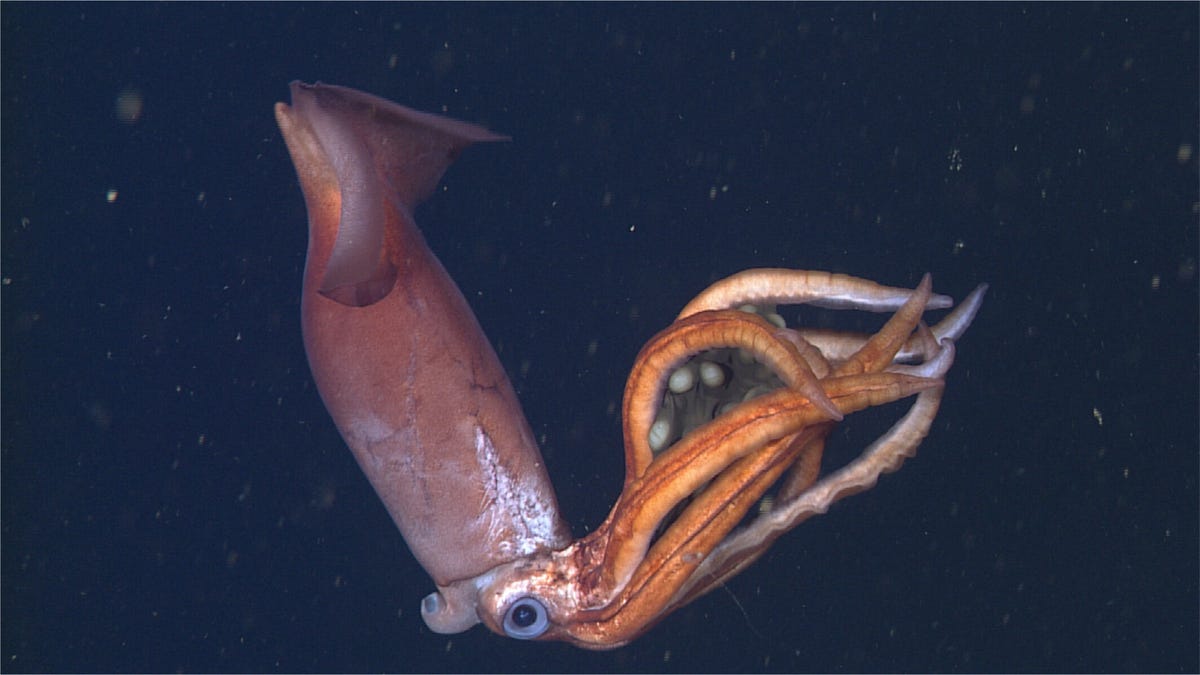
A team of deep sea scientists has made one mother of a find. In recent research, they detail the discovery of a female squid performing an unusual behavior for its kind: protecting and carrying around a clutch of giant eggs. The mama squid likely belongs to a previously unknown species of cephalopod, the researchers have determined.
Suggested Reading
Suggested Reading
The discovery was actually made in 2015 by scientists from the Monterey Bay Aquarium Research Institute (MBARI), the GEOMAR Helmholtz Centre for Ocean Research Kiel in Germany, and the University of South Florida. They had been using their robots in the deep basins of the Gulf of California, hoping to learn more about how animals live in the low-oxygen zones of the area when they came across the unexpected sight.
Advertisement
The pinkish-colored squid was observed around 8,419 feet (2,566 meters) deep, its tentacles carefully cradling her eggs. Squids typically lay their eggs in clumps that are either attached to the seafloor or drift along the water. But some species engage in this more protective behavior, also known as brooding. While brooding has been observed in deep sea squids before, it’s never quite looked like this. For starters, the squid’s eggs were relatively huge, measuring about a half-inch in diameter, while eggs belonging to other known brooding deep sea squids are about half that size. The squid was also only carrying around 30 to 40 eggs, compared to the sometimes thousands of eggs seen with other species.
Advertisement
After further studying their footage and comparing it to other squid sightings, the team came to the conclusion that they had indeed discovered a previously unknown species—one likely belonging to the family Gonatidae, also called armhook squids. The team’s research describing their findings was published last month in the journal Ecology; MBARI also released a short video snippet of the squid on its YouTube channel last week.
“The deep sea is the largest living space on Earth and there is a lot left to be discovered. Our unexpected encounter with a squid brooding giant eggs caught the attention of everyone in the ship’s control room,” said Steven Haddock, a senior scientist at MBARI and chief researcher during the 2015 expedition, in a statement released by MBARI. “This remarkable sighting underscores the diversity of ways that animals adapt to the unique challenges of living in the deep.”
Advertisement
Brooding is a drastic strategy for a squid to take, since the mother won’t eat while protecting her eggs and perishes soon after they hatch. And this newly discovered squid species might have an even harder time than others, since it could take one to four years for their young to emerge, given the larger size of the eggs, the researchers say (the current brooding record appears to be 4.5 years for a particular species of deep-sea octopus). But brooding does make it more likely for the eggs to survive. This squid may have evolved to brood giant eggs as a novel spin on this adaptation, the researchers argue, with the stable resources of the deep sea perhaps allowing them to invest more in the individual survival of their offspring.
Either way, as is often the case in science, this discovery will provide more mysteries for researchers to try to solve.
Advertisement
“Advanced underwater robots are helping us better understand the lives of deep-water squids, revealing fascinating new information about their biology and behavior. Each new observation is another piece of the puzzle,” said lead author Henk-Jan Hoving, a former MBARI fellow who is now leading the deep-sea biology working group at GEOMAR, in a statement.
Services Marketplace – Listings, Bookings & Reviews